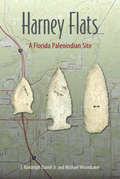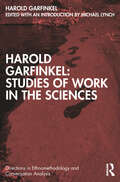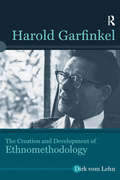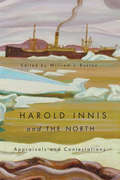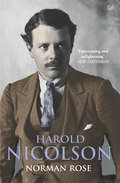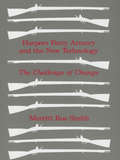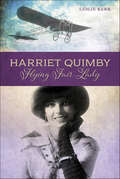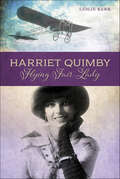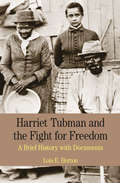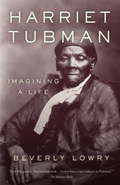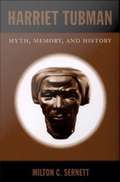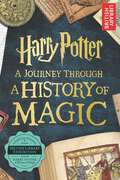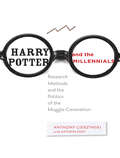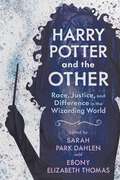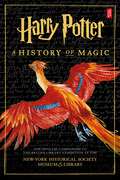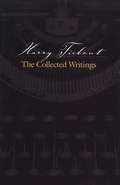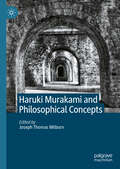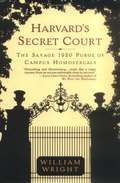- Table View
- List View
Harney Flats: A Florida Paleoindian Site (Florida Museum of Natural History: Riple)
by I. Randolph Daniel Michael Wisenbaker"Represents another stepping stone toward our understanding of life in the Southeast 10,000–11,000 years ago."--Southeastern Archaeology "The Paleoindian component at Harney Flats is a benchmark in early [human] studies in Florida and the Southeast."--North American Archaeologist "A work which must be recognized as a definitive study of Paleoindians in Florida and which will serve as a model for future archaeological studies throughout North America and elsewhere."--Florida Anthropologist "The book is a Florida Paleoindian classic."--Dan F. Morse, coauthor of Archaeology of the Central Mississippi Valley Discovered during construction of the I-75 corridor northeast of Tampa, the site of Harney Flats was a turning point in the archaeology of the southeastern United States. Beneath evidence of human settlement from the Middle Archaic period, researchers unearthed Paleoindian stone tools--representing a rare example of a stratified site in the Southeast with a Paleoindian occupation. The expansive excavations at Harney Flats demonstrated that significant land-based sites of early human settlement exist in Florida and are worth exploring. Harney Flats describes the excavation, which was praised for its state-of-the-art strategy and interpretive methods despite its sandy environment, and details the objects uncovered--projectile points, scrapers, adzes--and what they reveal about the lives of the people who used them. Including an update on relevant research since its first publication, this volume is the definitive account of a critical finding in the study of early human history.
Harold Garfinkel: Studies Of Work In The Sciences (Directions in Ethnomethodology and Conversation Analysis)
by Harold GarfinkelThis volume includes an unpublished manuscript and selected portions of five seminars by Harold Garfinkel – the founder of ethnomethodology – on the topic of practices in the natural sciences and mathematics. The volume provides a coherent and sustained account of his program for the study of ordinary and specialized social actions. Presenting broader theoretical and methodological initiatives, as well as discussions and summaries of exemplary studies of social phenomena within and beyond the sciences, this work dates to the period in the 1980s during which the field of Science and Technology Studies was taking shape, with ethnomethodological studies of scientific practice forming a major part of its development at the time. Aside from their historical importance, the manuscript and seminars present a distinctive perspective on the natural and social sciences that remains highly original and pertinent to research on science, social science, and everyday life today. Offering critical insights and proposals relating to developments in Ethnomethodology and Conversation Analysis, this volume will appeal to scholars of Sociology and Science and Technology Studies with interests in the work of Garfinkel. The Open Access version of this book, available at www.taylorfrancis.com, has been made available under a Creative Commons Attribution-Non Commercial-No Derivatives 4.0 license.
Harold Garfinkel: The Creation and Development of Ethnomethodology (Directions in Ethnomethodology and Conversation Analysis)
by Dirk vom LehnThis book is a concise intellectual biography of Harold Garfinkel, a key figure in 20th-century social science. Garfinkel is practically synonymous with ethnomethodology, an approach that since the 1960s has led to major analytic and methodological developments in sociology and other disciplines. This introduction to Garfinkel explores how he developed ethnomethodology under the influence of Talcott Parsons and Alfred Schutz, situates it within sociology generally, and demonstrates its important influence on recent developments in the discipline, particularly the sociology of science and technology, gender studies, organization studies, and the computer sciences. The book will be of wide interest in the social sciences and a useful supplement to courses on intellectual history and methodology.
Harold Innis and the North
by William J. BuxtonHarold Innis is widely understood as the proponent of the "Laurentian school" of historiography, which mapped Canadian development along an East-West axis. Harold Innis and the North turns the axis North-South by examining Innis's intense and abiding interest in the North, and providing new perspectives on this seminal figure in Canadian political economy and communication studies. This collection reveals that Innis's advocacy of the North was closely bound up with his vision of northern Canada as the site of a second industrial revolution based on mining, hydro-electric power, pulp and paper, and enabled by new forms of transportation. Long preoccupied with Canada's coming of age as a balanced and integrated industrial nation-state, Innis grappled with the same issues about the North in the Canadian nation that we are dealing with today. Chapters explore the breadth of Innis's northern activities, including his early studies of the fur trade, his biography of eighteenth-century explorer and cartographer Peter Pond, his review essays on the North for the Canadian Historical Review, his leadership of the Rockefeller-sponsored Arctic Survey, and his trip to the Soviet Union. Harold Innis and the North crafts a new narrative about the nature and scope of Innis's intellectual project and provides a unique appreciation of his multi-faceted professional identity. Contributors include Sergei Arkhipov (North-Ossetian State University and NGO Vladikavkaz Institute of Economics) Jeffrey Brison (Queens), George Colpitts (Calgary), Matthew Evenden (UBC), Barry Gough (Churchill College, Cambridge and Kings College, London), Paul Heyer (Wilfrid Laurier), Jim Mochoruk (North Dakota), Liza Piper (Alberta), Shirley Roburn (Concordia), Peter van Wyck (Concordia), Jeff Webb (Memorial).
Harold Innis and the North: Appraisals and Contestations
by William J. BuxtonHarold Innis is widely understood as the proponent of the "Laurentian school" of historiography, which mapped Canadian development along an East-West axis. Harold Innis and the North turns the axis North-South by examining Innis's intense and abiding interest in the North, and providing new perspectives on this seminal figure in Canadian political economy and communication studies. This collection reveals that Innis's advocacy of the North was closely bound up with his vision of northern Canada as the site of a second industrial revolution based on mining, hydro-electric power, pulp and paper, and enabled by new forms of transportation. Long preoccupied with Canada's coming of age as a balanced and integrated industrial nation-state, Innis grappled with the same issues about the North in the Canadian nation that we are dealing with today. Chapters explore the breadth of Innis's northern activities, including his early studies of the fur trade, his biography of eighteenth-century explorer and cartographer Peter Pond, his review essays on the North for the Canadian Historical Review, his leadership of the Rockefeller-sponsored Arctic Survey, and his trip to the Soviet Union. Harold Innis and the North crafts a new narrative about the nature and scope of Innis's intellectual project and provides a unique appreciation of his multi-faceted professional identity. Contributors include Sergei Arkhipov (North-Ossetian State University and NGO Vladikavkaz Institute of Economics) Jeffrey Brison (Queens), George Colpitts (Calgary), Matthew Evenden (UBC), Barry Gough (Churchill College, Cambridge and Kings College, London), Paul Heyer (Wilfrid Laurier), Jim Mochoruk (North Dakota), Liza Piper (Alberta), Shirley Roburn (Concordia), Peter van Wyck (Concordia), Jeff Webb (Memorial).
Harold Nicolson
by Norman RoseHarold Nicolson was a man of extraordinary gifts. A renowned politician, historian, biographer, diarist, novelist, lecturer, journalist, broadcaster and gardener, his position in society and politics allowed him an insight into the most dramatic events of British, indeed world, history.Nicolson's personal life was no less dramatic. Married to Vita Sackville-West, one of the most famous writers of her day, their marriage survived, even prospered, despite their both being practising homosexuals. Unashamedly elitist, bound together by their literary, social, and intellectual pursuits, moving in the refined circles of the Bloomsbury group they viewed life from the rarified peaks of aristocratic haughtiness. Few men could boast such gifts as Nicolson possessed, yet he ended his life plagued by self-doubt. 'I am attempting nothing; therefore I cannot fail,' he once acknowledged. What went wrong? It was a question that haunted Nicolson throughout his adult life. Relying on a wealth of archival material, Norman Rose brilliantly disentangles fact from fiction, setting Nicolson's story of perceived failure against the wider perspective of his times.
Harpers Ferry Armory and the New Technology: The Challenge of Change
by Merritt Roe SmithFocusing on the day-to-day operations of the U.S. armory at Harpers Ferry, Virginia, from 1798 to 1861, this book shows what the "new technology" of mechanized production meant in terms of organization, management, and worker morale. A local study of much more than local significance, it highlights the major problems of technical innovation and social adaptation in antebellum America. Merritt Roe Smith describes how positions of authority at the armory were tied to a larger network of political and economic influence in the community; how these relationships, in turn, affected managerial behavior; and how local social conditions reinforced the reactions of decision makers. He also demonstrates how craft traditions and variant attitudes toward work vis-à-vis New England created an atmosphere in which the machine was held suspect and inventive activity was hampered. Of central importance is the author's analysis of the drastic differences between Harpers Ferry and its counterpart, the national armory at Springfield, Massachusetts, which played a pivotal role in the emergence of the new technology. The flow of technical information between the two armories, he shows, moved in one direction only-- north to south. "In the end," Smith concludes, "the stamina of local culture is paramount in explaining why the Harpers Ferry armory never really flourished as a center of technological innovation." Pointing up the complexities of industrial change, this account of the Harpers Ferry experience challenges the commonly held view that Americans have always been eagerly receptive to new technological advances.
Harriet Jacobs
by Jean Fagan YellinHarriet Jacobs's Incidents in the Life of a Slave Girl remains the most-read woman's slave narrative of all time. Jean Fagan Yellin recounts the experiences that shaped Incidents-the years Jacobs spent hiding in her grandmother's attic from her sexually abusive master-as well as illuminating the wider world into which Jacobs escaped. Yellin's groundbreaking scholarship restores a life whose sorrows and triumphs reflect the history of the nineteenth century, from slavery to the Civil War, to Reconstruction and beyond.
Harriet Jacobs
by Jean Fagan YellinHarriet Jacobs's Incidents in the Life of a Slave Girl remains the most-read woman's slave narrative of all time. Jean Fagan Yellin recounts the experiences that shaped Incidents-the years Jacobs spent hiding in her grandmother's attic from her sexually abusive master-as well as illuminating the wider world into which Jacobs escaped. Yellin's groundbreaking scholarship restores a life whose sorrows and triumphs reflect the history of the nineteenth century, from slavery to the Civil War, to Reconstruction and beyond.
Harriet Jacobs in New Bedford (American Heritage)
by Peggi MedeirosIn 1861, Harriet Ann Jacobs published a masterpiece, Incidents in the Life of a Slave Girl. Her book is the first and only narrative to give voice to a woman who escaped slavery. Cornelia Grinnell Willis not only purchased Harriet's freedom, but she also developed a bond with Harriet and her daughter, Louisa, that lasted a lifetime. Both women suffered trauma as children and miraculously survived. They also had close ties to New Bedford that have not been examined previously. Cornelia married Nathaniel Parker Willis, considered an American Dickens during his lifetime though largely forgotten today. Join author and local historian Peggi Medeiros as she traces the fascinating lives of the Jacobs, Grinnell and Willis families in and out of New Bedford.
Harriet Quimby: Flying Fair Lady
by Leslie KerrOne of the first women to fly, Harriet Quimby paved the way for Amelia EarhartA Victorian-era woman who challenged the mores of her timeQuimby was a pioneer in photojournalism, script writing, and fashion design
Harriet Quimby: Flying Fair Lady
by Leslie KerrOne of the first women to fly, Harriet Quimby paved the way for Amelia Earhart
Harriet Tubman and the Fight for Freedom: A Brief History With Documents
by Lois HortonHarriet Tubman is a legendary figure in the history of American slavery and the Underground Railroad. In the introduction to this compelling volume, Lois Horton reveals the woman behind the legend and addresses the ways in which Tubman's mythic status emerged in her own lifetime and beyond. Going beyond mere biography, Horton weaves through Tubman's story the larger history of slavery, the antislavery movement, the Underground Railroad, the increasing sectionalism of the pre-Civil War era, as well as the war and post-war Reconstruction. A rich collection of accompanying documents — including the Fugitive Slave Acts, letters, newspaper articles, advertisements and tributes to Tubman — shed light on Tubman's relationships with key abolitionist figures such as Frederick Douglass and William Lloyd Garrison; her role in the women's rights movement; and her efforts on behalf of fugitive slaves and freed blacks through the Civil War and beyond. A chronology of Tubman's life, along with questions for consideration and a selected bibliography, enhance this important volume.
Harriet Tubman: Imagining a Life
by Beverly LowryFrom the award-winning novelist and biographer Beverly Lowry comes an astonishing re-imagining of the remarkable life of Harriet Tubman, the "Moses of Her People. " <P> Tubman was an escaped slave, lumberjack, laundress, raid leader, nurse, fund-raiser, cook, intelligence gatherer, Underground Railroad organizer, and abolitionist. In Harriet Tubman, Lowry creates a portrait enriched with lively imagined vignettes that transform the legendary icon into flesh and blood. We travel with Tubman on slave-freeing raids in the heart of the Confederacy, along the treacherous route of the Underground Railroad, and onto the battlefields of the Civil War. Integrating extensive research and interviews with scholars and historians into a rich and mesmerizing chronicle, Lowry brings an American hero to life as never before.
Harriet Tubman: Myth, Memory, and History
by Milton C. SernettHarriet Tubman is one of America's most beloved historical figures, revered alongside luminaries including Abraham Lincoln and Frederick Douglass. Harriet Tubman: Myth, Memory, and History tells the fascinating story of Tubman's life as an American icon. The distinguished historian Milton C. Sernett compares the larger-than-life symbolic Tubman with the actual "historical" Tubman. He does so not to diminish Tubman's achievements but rather to explore the interplay of history and myth in our national consciousness. Analyzing how the Tubman icon has changed over time, Sernett shows that the various constructions of the "Black Moses" reveal as much about their creators as they do about Tubman herself. Three biographies of Harriet Tubman were published within months of each other in 2003-04; they were the first book-length studies of the "Queen of the Underground Railroad" to appear in almost sixty years. Sernett examines the accuracy and reception of these three books as well as two earlier biographies first published in 1869 and 1943. He finds that the three recent studies come closer to capturing the "real" Tubman than did the earlier two. Arguing that the mythical Tubman is most clearly enshrined in stories told to and written for children, Sernett scrutinizes visual and textual representations of "Aunt Harriet" in children's literature. He looks at how Tubman has been portrayed in film, painting, music, and theater; in her Maryland birthplace; in Auburn, New York, where she lived out her final years; and in the naming of schools, streets, and other public venues. He also investigates how the legendary Tubman was embraced and represented by different groups during her lifetime and at her death in 1913. Ultimately, Sernett contends that Harriet Tubman may be America's most malleable and resilient icon.
Harriet, the Moses of Her People
by Sarah Hopkins BradfordIn 1869, Sarah Hopkins Bradford published Scenes in the Life of Harriet Tubman. Though often disjointed, this account presented to the public a legendary figure of the Underground Railroad. In 1886, Bradford substantially rewrote the biography at the request of Tubman, who hoped its sales would raise enough funds for the building of a hospital for old and disabled colored people. This second edition, Harriet, the Moses of Her People, provided little new information, but arranged the jumbled narrative of Scenes in chronological order, providing a clearer account of Tubman's life.A DOCSOUTH BOOK. This collaboration between UNC Press and the University of North Carolina at Chapel Hill Library brings selected classic works from the digital library of Documenting the American South back into print. DocSouth Books uses the latest digital technologies to make these works available as downloadable e-books or print-on-demand publications. DocSouth Books are unaltered from the original publication, providing affordable and easily accessible editions to a new generation of scholars, students, and general readers.
Harry Potter - A Journey Through A History of Magic
by British British LibraryHarry Potter: A History of Magic is the official companion eBook to the special exhibition Harry Potter: A History of Magic that ran at the British Library in 2017 and New-York Historical Society in 2018. Explore the extraordinary subjects of the Hogwarts curriculum - Potions & Alchemy, Divination, Care of Magical Creatures, and more - and examine incredible historical artifacts, items from J.K. Rowling's personal archive, and stunning original artwork from Harry Potter series artists Mary GrandPré, Jim Kay, and Brian Selznick. This complete catalogue of the over 150 artifacts on display gives readers an up-close look at magical treasures from all over the world, and their inspiration on J.K. Rowling's magical inventions. Readers will be able to pore over ancient spell books, explore amazing illuminated scrolls that reveal the secret of the Elixir of Life, and through its unique design and functionality examine vials of dragon's blood, mandrake roots, painted centaurs and a genuine witch's broomstick. This special publication is an essential volume for all Harry Potter fans, history buffs, bibliophiles, and is a fascinating exploration of the history of the magic at the heart of the Harry Potter stories.
Harry Potter and the Millennials: Research Methods and the Politics of the Muggle Generation
by Anthony GierzynskiA national survey of college students reveals connections between political opinion and popular culture.Without a doubt the Harry Potter series has had a powerful effect on the Millennial Generation. Millions of children grew up immersed in the world of the boy wizard—reading the books, dressing up in costume to attend midnight book release parties, watching the movies, and even creating and competing in Quidditch tournaments. Beyond what we know of the popularity of the series, however, nothing has been published on the question of the Harry Potter effect on the politics of its young readers—now voting adults. Looking to engage his students in exploring the connections between political opinion and popular culture, Anthony Gierzynski conducted a national survey of more than 1,100 college students and examined these connections as well as Millennial politics. Harry Potter and the Millennials tells the fascinating story of how the team designed the study and gathered results, explains what conclusions can and cannot be drawn, and reveals the challenges social scientists face in studying political science, sociology, and mass communication. Specifically, the evidence indicates that Harry Potter fans are more open to diversity and are more politically tolerant than nonfans; fans are also less authoritarian, less likely to support the use of deadly force or torture, more politically active, and more likely to have had a negative view of the Bush administration. Furthermore, these differences do not disappear when controlling for other important predictors of these perspectives, lending support to the argument that the series indeed had an independent effect on its audience. In this clear and cogent account, Gierzynski demonstrates how social scientists develop and design research questions and studies. An appendix of questions and resulting data, including graphs and diagrams, will appeal especially to instructors seeking to explain the nuances of political socialization. Gierzynski’s captivating analysis of media’s impact on political views, combined with the enjoyable Potter story details, makes for an irresistible project that social scientists can use to work a little magic in their classrooms.
Harry Potter and the Other: Race, Justice, and Difference in the Wizarding World (Children's Literature Association Series)
by Sarah Park Dahlen and Ebony Elizabeth ThomasNamed a 2023 Honour Book by the International Research Society for Children's LiteratureContributions by Christina M. Chica, Kathryn Coto, Sarah Park Dahlen, Preethi Gorecki, Tolonda Henderson, Marcia Hernandez, Jackie C. Horne, Susan E. Howard, Peter C. Kunze, Florence Maätita, Sridevi Rao, Kallie Schell, Jennifer Patrice Sims, Paul Spickard, Lily Anne Welty Tamai, Ebony Elizabeth Thomas, Jasmine Wade, Karin E. Westman, and Charles D. Wilson Race matters in the fictional Wizarding World of the Harry Potter series as much as it does in the real world. As J. K. Rowling continues to reveal details about the world she created, a growing number of fans, scholars, readers, and publics are conflicted and concerned about how the original Wizarding World—quintessentially white and British—depicts diverse and multicultural identities, social subjectivities, and communities. Harry Potter and the Other: Race, Justice, and Difference in the Wizarding World is a timely anthology that examines, interrogates, and critiques representations of race and difference across various Harry Potter media, including books, films, and official websites, as well as online forums and the classroom. As the contributors to this volume demonstrate, a deeper reading of the series reveals multiple ruptures in popular understandings of the liberatory potential of the Potter series. Young people who are progressive, liberal, and empowered to question authority may have believed they were reading something radical as children and young teens, but increasingly they have raised alarms about the series’ depiction of peoples of color, cultural appropriation in worldbuilding, and the author’s antitrans statements in the media. Included essays examine the failed wizarding justice system, the counterproductive portrayal of Nagini as an Asian woman, the liberation of Dobby the elf, and more, adding meaningful contributions to existing scholarship on the Harry Potter series. As we approach the twenty-fifth anniversary of the publication of Harry Potter and the Philosopher’s Stone, Harry Potter and the Other provides a smorgasbord of insights into the way that race and difference have shaped this story, its world, its author, and the generations who have come of age during the era of the Wizarding World.
Harry Potter's Bookshelf
by John GrangerHarry Potter. The name conjures up J.K. Rowling's wondrous world of magic that has captured the imaginations of millions on both the printed page and the silver screen with bestselling novels and blockbuster films. The true magic found in this children's fantasy series lies not only in its appeal to people of all ages but in its connection to the greater world of classic literature. Harry Potter's Bookshelf: The Great Books Behind the Hogwarts Adventures explores the literary landscape of themes and genres J.K. Rowling artfully wove throughout her novels-and the influential authors and stories that inspired her. From Jane Austen's Emma and Charles Dickens's class struggles, through the gothic romances of Dracula and Frankenstein and the detective mysteries of Dorothy L. Sayers, to the dramatic alchemy of C.S. Lewis, J.R.R. Tolkien, and William Shakespeare, Rowling cast a powerful spell with the great books of English literature that transformed the story of a young wizard into a worldwide pop culture phenomenon.
Harry Potter: The eBook of the Exhibition
by British British LibraryHarry Potter: A History of Magic is the official companion eBook to the special exhibition Harry Potter: A History of Magic that ran at the British Library in 2017 and New-York Historical Society in 2018. Explore the extraordinary subjects of the Hogwarts curriculum - Potions & Alchemy, Divination, Care of Magical Creatures, and more - and examine incredible historical artifacts, items from J.K. Rowling's personal archive, and stunning original artwork from Harry Potter series artists Mary GrandPré, Jim Kay, and Brian Selznick. This complete catalogue of the over 150 artifacts on display gives readers an up-close look at magical treasures from all over the world, and their inspiration on J.K. Rowling's magical inventions. Readers will be able to pore over ancient spell books, explore amazing illuminated scrolls that reveal the secret of the Elixir of Life, and through its unique design and functionality examine vials of dragon's blood, mandrake roots, painted centaurs and a genuine witch's broomstick. This special publication is an essential volume for all Harry Potter fans, history buffs, bibliophiles, and is a fascinating exploration of the history of the magic at the heart of the Harry Potter stories.
Harry T. Burleigh: From the Spiritual to the Harlem Renaissance
by Jean E SnyderHarry T. Burleigh (1866-1949) played a leading role in American music and culture in the twentieth century. Celebrated for his arrangements of spirituals, Burleigh was also the first African American composer to create a significant body of art song. An international roster of opera and recital singers performed his works and praised them as among the best of their time. Jean E. Snyder traces Burleigh's life from his Pennsylvania childhood through his fifty-year tenure as soloist at St. George's Episcopal Church in Manhattan. As a composer, Burleigh's pioneering work preserved and transformed the African American spiritual; as a music editor, he facilitated the work of other black composers; as a role model, vocal coach, and mentor, he profoundly influenced American song; and in private life he was friends with AntonÃn DvoÅTMák, Marian Anderson, Will Marion Cook, and other America luminaries. Snyder provides rich historical, social, and political contexts that explore Burleigh's professional and personal life within an era complicated by changes in race relations, class expectations, and musical tastes.
Harry Tiebout: The Collected Writings
by AnonymousThis collection of writings by Harry Tiebout, one of the first psychiatrists to describe alcoholism as a disease, are seminal documents in the history, treatment, and understanding of alcoholism.One of the first psychiatrists to describe alcoholism as a disease rather than a moral failing or criminal activity, Harry M. Tiebout was also one of the first to wholeheartedly endorse Alcoholics Anonymous as an effective force in the struggle against compulsive drinking. This volume brings together, for the first time, some of Tiebout's most influential writings. Many of these pieces--from explorations of the therapeutic approach to alcoholism to instructive discussions of the act of surrender so crucial to recovery--are seminal documents in the history, treatment, and understanding of alcoholism. Together, they represent the significant contribution of one man to the countless lives shaken by alcoholism and steadied with the help of Alcoholics Anonymous, psychiatric intervention, and the foresight and commitment of doctors like Harry Tiebout.
Haruki Murakami and Philosophical Concepts
by Joseph Thomas MilburnThis book provides interdisciplinary perspectives on the work of the Japanese writer Haruki Murakami, with a particular focus on the conceptual material of his work. It seeks to answer the following questions: Is there any philosophic material or concepts in the work of Haruki Murakami? If so, why are they important? Does philosophic engagement add anything to the Murakami research field? Equally, does Murakami&’s fiction present us with anything valuable for the field of philosophy? The volume uniquely develops the field of Murakami studies through acting as a forum for interdisciplinary researchers to share their perspective on his work. Importantly, it furthers the conversation on Murakami&’s philosophic value and through doing so, is a must-read not only for those interested in Japanese literature or culture, but also for those interested in the productive space existing at the intersection of philosophy, literature, and psychoanalysis.
Harvard's Secret Court: The Savage 1920 Purge of Campus Homosexuals
by William WrightIn 2002 a researcher with the Harvard Crimson came across a stack of files labeled, "Secret Court Files, 1920." The accidental discovery led to the unveiling of an episode in the university's history which had been hidden away for more than eighty years. In the spring of 1920, Harvard officials were notified of a group of active homosexuals on campus. Students were called in for questioning one at a time, and many were immediately expelled. Furthermore, the school used its power to shatter the futures of these young men, making it impossible for them to be admitted to other schools or to enter the professions of their choosing. Based on the original documents and interviews with surviving family members, this book is a poignant account of the 1920 purge and a reflection upon the fear and prejudice which brought it about.
